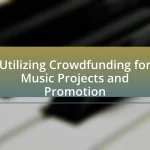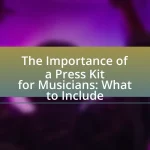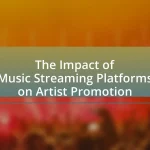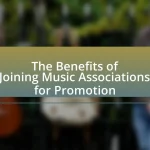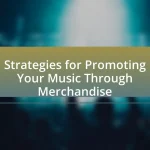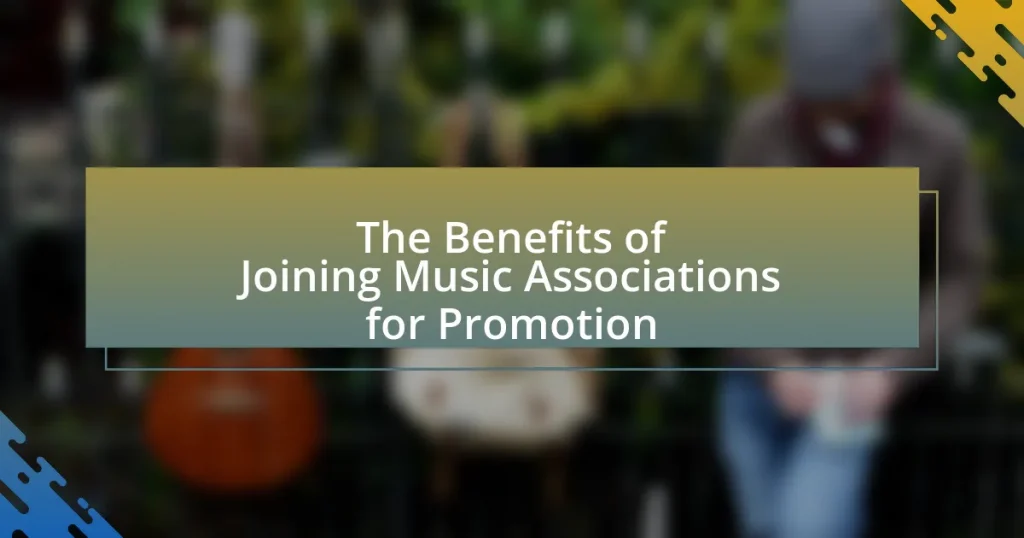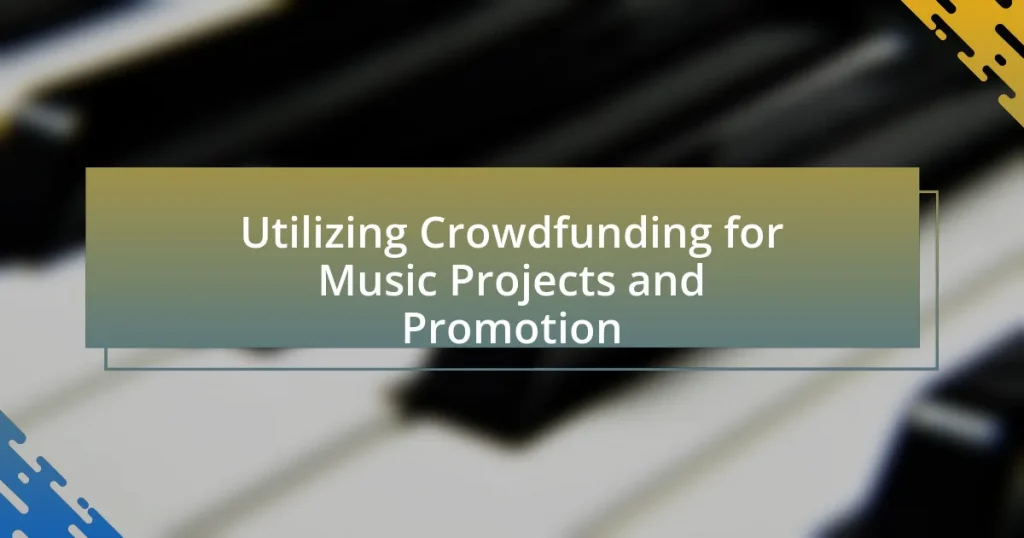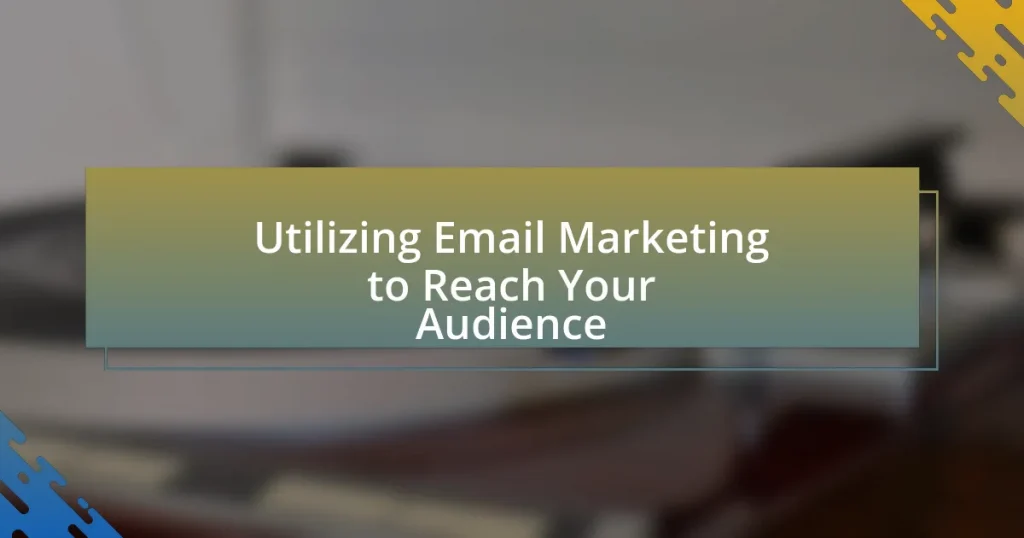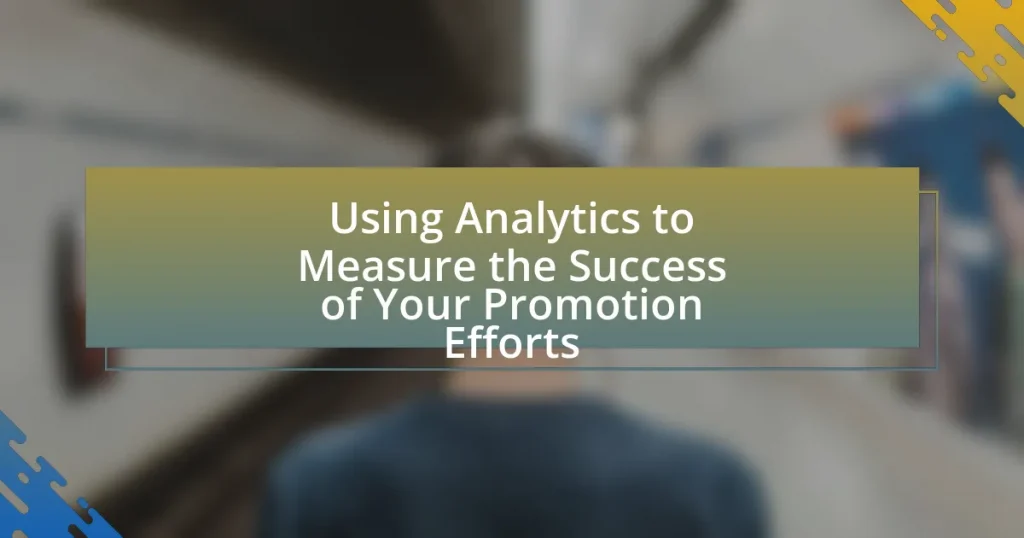Music associations play a crucial role in promoting artists by providing enhanced visibility, networking opportunities, and access to industry resources. These organizations facilitate connections among musicians and industry professionals through events, showcases, and educational workshops, which can lead to collaborations and increased exposure. Membership in associations like the American Society of Composers, Authors and Publishers (ASCAP) offers artists valuable promotional tools, marketing insights, and funding opportunities, ultimately supporting their career growth and professional branding. Additionally, associations help emerging artists navigate the music industry by offering mentorship programs and resources tailored to their development needs.
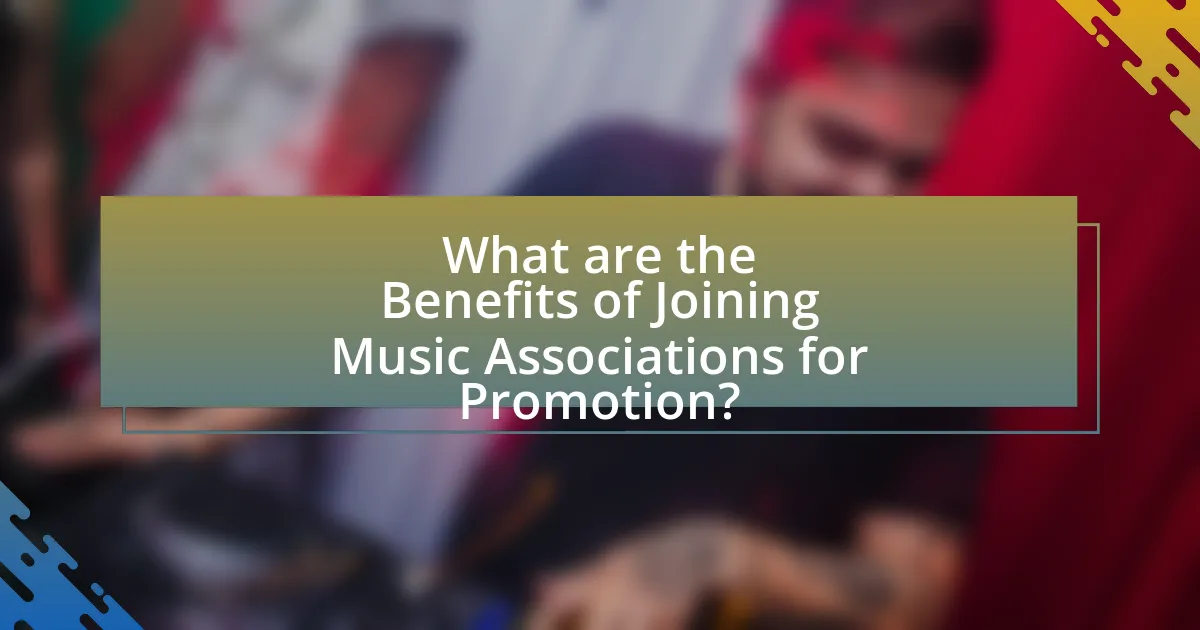
What are the Benefits of Joining Music Associations for Promotion?
Joining music associations for promotion provides artists with enhanced visibility, networking opportunities, and access to industry resources. These associations often have established platforms for showcasing talent, which can lead to increased exposure through events, showcases, and collaborations. For instance, organizations like the American Society of Composers, Authors and Publishers (ASCAP) offer members opportunities to connect with industry professionals and participate in promotional events, thereby amplifying their reach. Additionally, membership can provide access to valuable resources such as marketing tools, industry insights, and educational workshops, which can further aid in an artist’s promotional efforts.
How do music associations enhance visibility for artists?
Music associations enhance visibility for artists by providing networking opportunities, promotional platforms, and industry recognition. These organizations often host events, workshops, and showcases that allow artists to connect with industry professionals, including producers, agents, and other musicians, thereby increasing their exposure. For instance, the American Society of Composers, Authors and Publishers (ASCAP) offers events that spotlight emerging artists, leading to potential collaborations and performance opportunities. Additionally, music associations often have established channels for marketing and public relations, which can amplify an artist’s reach through newsletters, social media, and industry publications. This structured support system not only elevates an artist’s profile but also validates their work within the industry, making it easier for them to gain traction and build a fan base.
What promotional opportunities do music associations provide?
Music associations provide various promotional opportunities, including networking events, showcases, and access to industry resources. These associations often organize events where members can perform, gain visibility, and connect with industry professionals, which can lead to potential collaborations and career advancements. Additionally, many music associations offer platforms for members to share their work, such as newsletters, social media channels, and websites, enhancing their reach to broader audiences. For instance, the American Society of Composers, Authors, and Publishers (ASCAP) hosts events that allow members to showcase their music to industry insiders, thereby increasing their promotional chances.
How can networking through associations lead to more exposure?
Networking through associations can lead to more exposure by providing access to a wider audience and industry connections. When individuals engage with music associations, they gain opportunities to collaborate with other artists, industry professionals, and influencers, which can amplify their visibility. For instance, associations often host events, workshops, and showcases that attract media attention and potential fans, thereby increasing the chances of being discovered. Additionally, members can leverage the collective reputation of the association, which can enhance their credibility and attract more opportunities for promotion.
Why is collaboration important in music promotion?
Collaboration is important in music promotion because it amplifies reach and enhances credibility. When artists and industry professionals work together, they can leverage each other’s audiences, resulting in increased visibility and engagement. For instance, a study by the Music Industry Research Association found that collaborative marketing efforts can lead to a 30% increase in audience engagement compared to solo promotions. This synergy not only broadens the promotional network but also fosters trust among fans, as collaborations often signal quality and shared values in music.
How do music associations facilitate collaboration among artists?
Music associations facilitate collaboration among artists by providing networking opportunities, resources, and platforms for joint projects. These organizations often host events, workshops, and showcases that bring together musicians from various genres, fostering connections that can lead to collaborative efforts. For instance, the American Society of Composers, Authors and Publishers (ASCAP) organizes events that encourage artists to meet and collaborate, resulting in numerous successful partnerships. Additionally, music associations may offer funding, grants, or access to industry contacts, further enhancing the potential for collaboration among their members.
What role do associations play in creating joint promotional events?
Associations play a crucial role in creating joint promotional events by facilitating collaboration among members and providing resources for effective marketing. They often organize events that leverage the collective reach and influence of their members, allowing for shared costs and increased visibility. For instance, music associations frequently coordinate festivals or showcases that feature multiple artists, enhancing audience engagement and attracting larger crowds. This collaborative approach not only amplifies promotional efforts but also fosters a sense of community among members, ultimately leading to greater success in reaching target audiences.
What resources do music associations offer for promotion?
Music associations offer various resources for promotion, including networking opportunities, marketing tools, and access to industry events. These associations often provide platforms for members to connect with industry professionals, which can lead to collaborations and increased visibility. Additionally, they may offer promotional materials, such as press kits and templates for social media campaigns, to help members effectively market their music. Many associations also organize showcases and festivals where members can perform, gaining exposure to wider audiences and industry representatives.
How can educational resources from associations improve promotional strategies?
Educational resources from associations can enhance promotional strategies by providing members with industry-specific knowledge, best practices, and marketing tools tailored to the music sector. These resources often include workshops, webinars, and access to case studies that equip members with effective promotional techniques. For instance, the American Association of Independent Music offers educational programs that teach members how to leverage social media and digital marketing effectively, leading to increased visibility and audience engagement. Such targeted educational initiatives have been shown to improve promotional outcomes, as members apply learned strategies to reach broader audiences and enhance their brand presence in the competitive music industry.
What tools and platforms do associations provide for marketing music?
Associations provide various tools and platforms for marketing music, including social media promotion, industry networking events, and access to digital distribution services. These resources enable artists to reach wider audiences and connect with industry professionals. For instance, organizations like the American Society of Composers, Authors, and Publishers (ASCAP) offer promotional opportunities through showcases and workshops, while platforms like SoundExchange facilitate digital distribution and royalty collection. Such tools enhance visibility and support artists in navigating the music industry effectively.
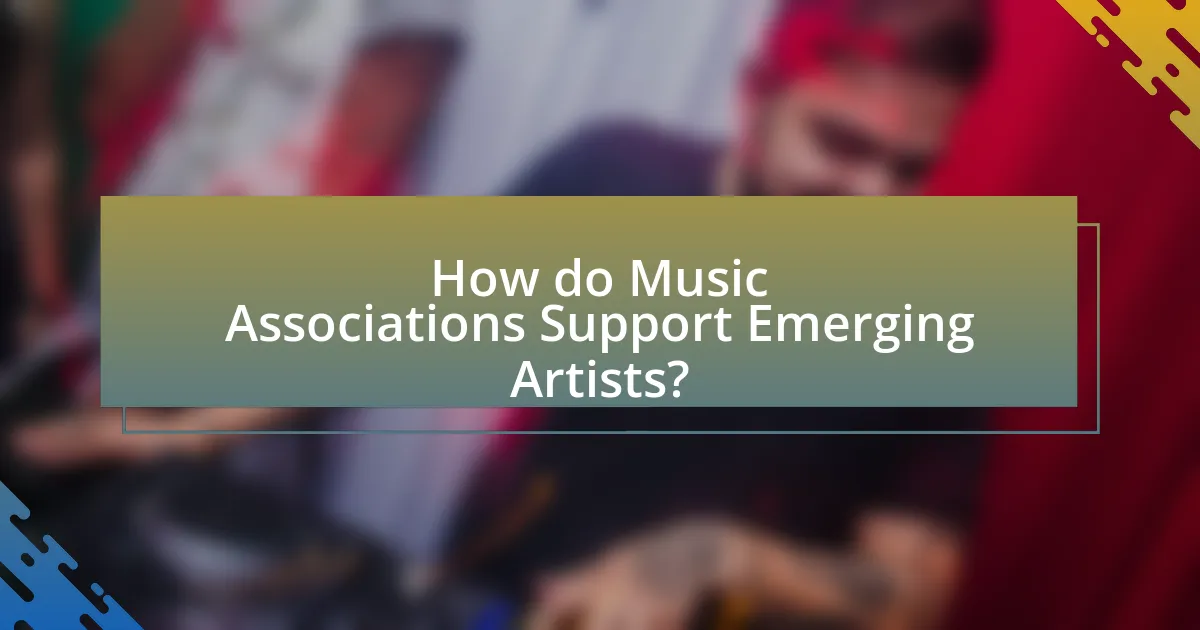
How do Music Associations Support Emerging Artists?
Music associations support emerging artists by providing resources, networking opportunities, and promotional platforms. These organizations often offer workshops, mentorship programs, and access to industry professionals, which help artists develop their skills and navigate the music business. For instance, the American Society of Composers, Authors and Publishers (ASCAP) provides educational resources and showcases for new talent, facilitating exposure and connections within the industry. Additionally, music associations may organize events and competitions that highlight emerging artists, increasing their visibility and potential for career advancement.
What specific programs do associations have for new musicians?
Associations offer various specific programs for new musicians, including mentorship initiatives, networking events, and educational workshops. These programs are designed to provide guidance, foster connections within the industry, and enhance skills. For instance, organizations like the American Society of Composers, Authors, and Publishers (ASCAP) provide mentorship programs that pair emerging artists with experienced professionals, facilitating knowledge transfer and career development. Additionally, the Music Business Association hosts networking events that allow new musicians to meet industry leaders and peers, which can lead to collaboration opportunities. Educational workshops, often organized by associations such as the National Association of Recording Merchandisers (NARM), focus on essential topics like marketing strategies and digital distribution, equipping new musicians with the tools needed to succeed in a competitive landscape.
How do mentorship programs within associations benefit emerging artists?
Mentorship programs within associations benefit emerging artists by providing them with guidance, industry insights, and networking opportunities essential for their development. These programs connect novice artists with experienced professionals who can offer personalized advice, helping them navigate the complexities of the music industry. For instance, a study by the National Endowment for the Arts found that artists who participated in mentorship programs reported a 30% increase in their confidence and skills, leading to more successful career trajectories. Additionally, mentorship fosters relationships that can lead to collaborations, performance opportunities, and exposure to wider audiences, which are crucial for emerging artists seeking to establish their presence in the competitive music landscape.
What funding opportunities are available through music associations?
Music associations offer various funding opportunities, including grants, scholarships, and sponsorships. These financial resources are designed to support musicians, composers, and music educators in their professional development and projects. For instance, organizations like the American Society of Composers, Authors, and Publishers (ASCAP) provide grants for music creation and performance, while the National Endowment for the Arts (NEA) offers funding for arts projects, including music initiatives. Additionally, many local music associations have their own scholarship programs aimed at supporting students pursuing music education. These funding opportunities are essential for fostering talent and promoting musical endeavors within the community.
How can associations help in building a professional brand?
Associations can significantly aid in building a professional brand by providing networking opportunities, resources, and credibility. Membership in a music association connects individuals with industry professionals, facilitating collaborations and partnerships that enhance visibility. Additionally, associations often offer workshops, seminars, and access to industry insights that help members refine their skills and knowledge, further strengthening their brand. Furthermore, being associated with a reputable organization lends credibility, as it signals to clients and peers that the individual adheres to industry standards and practices. For instance, according to a survey by the National Association of Music Merchants, 70% of music professionals reported that association membership positively impacted their career advancement and brand recognition.
What branding resources do music associations provide?
Music associations provide a variety of branding resources, including promotional materials, networking opportunities, and educational workshops. These resources help musicians and industry professionals enhance their visibility and marketability. For instance, associations often offer access to templates for press kits, logos, and social media graphics, which can streamline the branding process. Additionally, they facilitate connections with industry experts and peers, allowing members to share best practices and collaborate on promotional efforts. Educational workshops on branding strategies and marketing techniques further equip members with the skills needed to effectively promote their music.
How do associations assist in developing an artist’s online presence?
Associations assist in developing an artist’s online presence by providing networking opportunities, resources, and promotional platforms. These organizations often host events, workshops, and online forums that connect artists with industry professionals and peers, enhancing visibility. For instance, membership in a music association can lead to features in newsletters, social media shout-outs, and inclusion in curated playlists, which significantly increase an artist’s reach. Additionally, associations may offer tools for digital marketing and branding, helping artists to create a cohesive online identity. This structured support is crucial, as studies show that artists with strong online presences are more likely to attract fans and industry attention, ultimately leading to career growth.
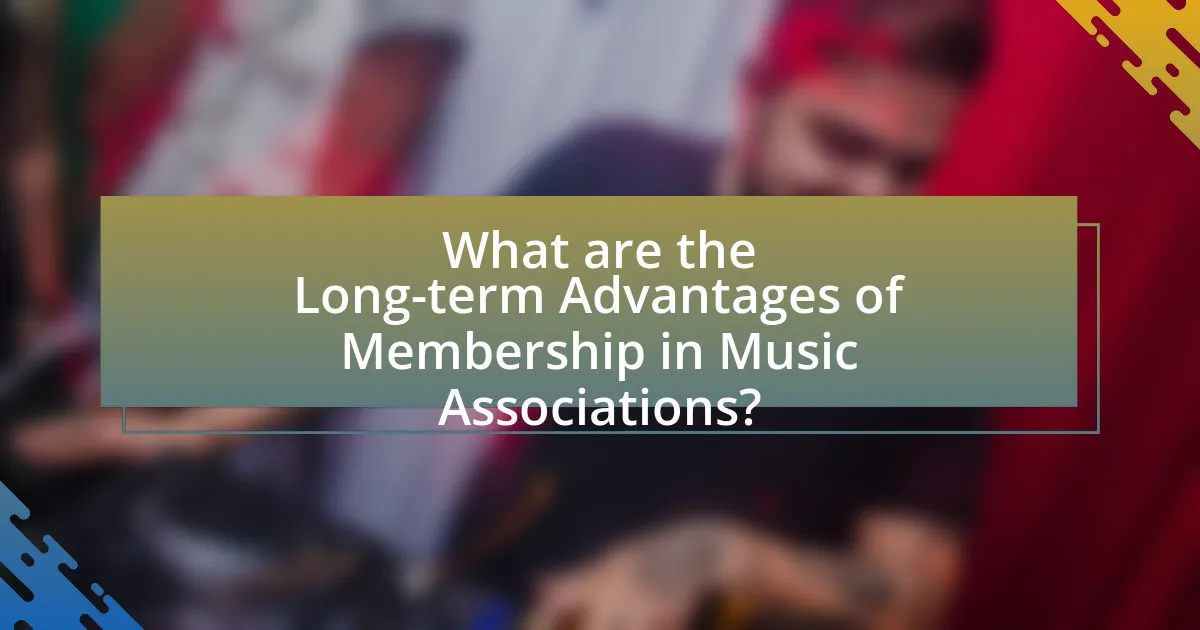
What are the Long-term Advantages of Membership in Music Associations?
Membership in music associations provides long-term advantages such as enhanced networking opportunities, access to resources, and professional development. These associations often facilitate connections among musicians, industry professionals, and educators, which can lead to collaborations and career advancements. Additionally, members typically gain access to exclusive resources like workshops, grants, and industry insights that can significantly aid in their artistic growth. Research indicates that musicians who engage with professional associations report higher levels of satisfaction and success in their careers, underscoring the value of such memberships in fostering long-term professional relationships and opportunities.
How does long-term membership impact an artist’s career trajectory?
Long-term membership in music associations significantly enhances an artist’s career trajectory by providing consistent networking opportunities, access to industry resources, and promotional support. Artists who maintain membership often benefit from increased visibility through association-sponsored events, showcases, and marketing initiatives, which can lead to more performance opportunities and collaborations. For instance, a study by the Music Industry Research Association found that artists affiliated with professional organizations reported a 30% increase in booking opportunities compared to those without such affiliations. This sustained engagement fosters professional development and can lead to long-term career growth and stability in the competitive music industry.
What success stories illustrate the benefits of sustained association membership?
Sustained association membership has led to significant success stories, particularly in the music industry. For instance, the American Society of Composers, Authors, and Publishers (ASCAP) has provided its members with access to performance royalties, networking opportunities, and educational resources, resulting in increased visibility and income for many artists. A notable example is the rise of singer-songwriter Hozier, who credits his ASCAP membership for facilitating connections that helped launch his career. Additionally, the National Association of Recording Merchandisers (NARM) has supported independent labels, enabling them to thrive in a competitive market through shared resources and collective marketing efforts, exemplified by the success of labels like Sub Pop, which gained fame for promoting artists like Nirvana. These examples illustrate how sustained membership in music associations can enhance career growth and industry presence.
How can ongoing support from associations lead to career growth?
Ongoing support from associations can significantly lead to career growth by providing networking opportunities, access to resources, and professional development. Associations often facilitate connections among members, allowing individuals to build relationships with industry professionals, which can result in job opportunities and collaborations. For instance, a study by the National Association of Music Merchants found that 70% of music professionals attribute their career advancements to networking within associations. Additionally, associations offer workshops, mentorship programs, and access to industry insights that enhance skills and knowledge, further contributing to career advancement.
What are the potential challenges of joining music associations?
Joining music associations can present several challenges, including financial costs, time commitments, and potential conflicts with personal artistic goals. Financially, many associations require membership fees, which can be a barrier for emerging artists. Time commitments can also be significant, as active participation often involves attending meetings, events, and networking opportunities, which may detract from personal practice or performance time. Additionally, some musicians may find that the goals and priorities of the association do not align with their own artistic vision, leading to conflicts that can hinder their creative expression. These challenges can impact the overall experience and benefits that musicians seek from association membership.
How can artists navigate the challenges of association membership?
Artists can navigate the challenges of association membership by actively engaging with the organization, utilizing available resources, and networking with fellow members. Active participation in meetings and events allows artists to stay informed about opportunities and challenges within the association. Utilizing resources such as workshops, mentorship programs, and promotional tools provided by the association can enhance their skills and visibility. Networking with other members fosters collaboration and support, which can lead to shared opportunities and solutions to common challenges. These strategies are supported by studies indicating that active engagement in professional associations significantly increases members’ career advancement and satisfaction.
What should artists consider before joining a music association?
Artists should consider the alignment of their goals with the mission and values of the music association before joining. This alignment ensures that the association can effectively support the artist’s career objectives, such as networking opportunities, promotional resources, and industry advocacy. Additionally, artists should evaluate the association’s reputation, membership benefits, and the potential for exposure to new audiences. Research indicates that associations with strong industry connections can significantly enhance an artist’s visibility and career growth, as seen in the success stories of members from organizations like the American Society of Composers, Authors, and Publishers (ASCAP), which has helped numerous artists gain recognition and financial support.
What are the best practices for maximizing benefits from music associations?
To maximize benefits from music associations, individuals should actively engage in networking opportunities and participate in events organized by the association. Engaging with fellow members fosters relationships that can lead to collaborations, exposure, and support within the industry. Additionally, utilizing the resources provided by the association, such as workshops, promotional platforms, and industry insights, enhances professional development and visibility. Research indicates that members who attend events and utilize resources report higher satisfaction and career advancement, demonstrating the effectiveness of these practices in leveraging the full potential of music associations.
